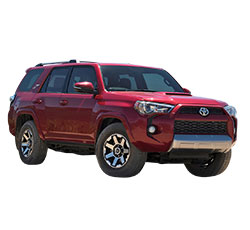2017 Toyota 4Runner Pros vs Cons

What’s New for 2017?
Aside from renaming a few trims, Toyota did not make any major changes to the new 4Runner. It is essentially a carryover from last year.Ten Reasons You May Like the 2017 Toyota 4Runner – The Pros
1. Proven Engine & Transmission
The SUV’s standard V-6 engine has been around for a while. Drivers like its low-end grunt and durability. It develops a healthy 270 horsepower and 276 pound-feet of torque. Known for its precise shifting, the 4Runner’s five-speed automatic transmission always chooses the ideal gear. Although the 4Runner is not exceptionally quick, you will always have ample passing power.
2. Can Tow a Decent Load
Drivers can definitely use the 2017 Toyota 4Runner to pull a load. It is rated to tow up to 5,000 pounds. This is a good amount of weight for a midsize SUV. To make it easier for drivers to attach a trailer, Toyota includes an integrated tow-hitch receiver on every trim. You will be able to transport a small camper with no trouble.
3. Exceptional Off-Road Performance
Toyota engineered the 4Runner to be a very capable off-road machine. There are several enhancements available. A Crawl Control feature enables the SUV to slowly creep down a steep incline. When traveling in deep snow or mud, the 4Runner's locking rear differential will help you to gain extra traction. Featuring a front skid plate and upgraded suspension components, the TRD Pro model is especially tough.
4. Optional Kinetic Dynamic Suspension
Available as an option, Toyota ’s Kinetic Dynamic Suspension enhances the 4Runner’s driving dynamics. The advanced suspension gives the SUV an extra degree of stability. You will notice less body roll on curvy roads. You will also appreciate the upgraded suspension when traveling off-road. It automatically adjusts itself based on the evenness of the terrain.
5. Brawny Styling
The 4Runner has a very muscular appearance. An elevated suspension enables it to stand tall. All of the off-road models look remarkably tough. An available hood scoop further enhances the 4Runner’s sportiness. If you desire a less aggressive look, step up to the luxurious Limited model. It features an attractive chrome grille and a stylish set of 20-inch wheels.
6. Enough Room for Families
There is enough room inside of the 2017 Toyota 4Runner to accommodate a family of five. Even tall drivers will enjoy being behind the wheel. When riding in the backseat, your family members should not have any complaints. With around 46 cubic feet of cargo space in the back, the 4Runner is perfect for taking adventurous road trips.
7. Built to Last
For good reason, the 4Runner has one of the highest resale values in its class. Owners rave about its outstanding build quality. Every component on the SUV is made to last. The 4Runner’s sturdy construction will help it to remain on the road for many years to come. Excellent reliability remains yet another key attribute.
8. User-Friendly Design
Automotive journalists give the 2017 Toyota 4Runner high marks for its user-friendly design. Drivers will definitely like the 4Runner’s easy-to-use technologies. Even the Entune infotainment system is a breeze to navigate. Adjusting the climate control system only takes a few seconds. Whether you are traveling during the day or at night, the gauge cluster is extremely easy to read.
9. Luxurious Limited Model
Some drivers will enjoy the Limited model’s luxurious features. Perforated leather seats give the cabin a more upscale character. Some of the other niceties include a 15-speaker sound system, a dual-zone climate control system, and parking sensors. Expect to shell out more than $42,000 for the 4Runner Limited.
10. Safety Connect® Feature
Available as an option, Toyota ’s Safety Connect® system provides full-time emergency support. If you happen to experience any trouble, you can use the system to immediately contact roadside assistance. A “SOS” button makes the entire process extremely simple.
Reasons You May Not Like the 2017 Toyota 4Runner – The Cons
1. Below-Average Fuel Economy
Unfortunately, the Toyota 4Runner consumes more fuel than some of its competitors. It is rated to return 17 mpg in the city and 21 mpg on the highway. This could be an issue for the owners who want to use their 4Runner as a daily-driver.
2. Rides Like a Truck
Some drivers won’t mind the 4Runner’s truck-like ride quality. However, there are others who will desire a softer ride. While driving the 4Runner, expect to experience a bit of choppiness on rough pavement.
3. Few Advanced Safety Features
If you demand the latest advanced safety technologies, the new 4Runner will likely leave you disappointed. It fails to offer innovations such as blind-spot detection and automatic braking. While behind the wheel of the 4Runner, you must rely more on your driving skills to detect obstacles.
How it stacks up to the competition:
Some of the key competitors include the Ford Explorer and the Nissan Pathfinder. In terms of off-road capabilities, the 4Runner easily outshines these two SUVs. Because of the 4Runner’s extra undercarriage protection, it is more suitable for traveling on rough terrain. Furthermore, only the 4Runner comes standard with a towing package.
Conclusion:
The 2017 Toyota 4Runner remains a good choice for the drivers who need a tough and durable SUV. Even the base SR5 model is a skilled off-road performer. User-friendly technologies make the 4Runner an even more satisfying choice. Although the 4Runner does not offer many advanced safety features, its sturdy construction should keep you and your family protected.
• 2017 Toyota 86 Buying Guide
• 2017 Toyota Avalon Buying Guide
• 2017 Toyota Avalon Hybrid Buying Guide
• 2017 Toyota Camry Buying Guide
• 2017 Toyota Camry Hybrid Buying Guide
• 2017 Toyota Corolla Buying Guide
• 2017 Toyota Corolla iM Buying Guide
• 2017 Toyota Highlander Buying Guide
• 2017 Toyota Highlander Hybrid Buy Guide
• 2017 Toyota Landcruiser Buying Guide
• 2017 Toyota Prius Buying Guide
• 2017 Toyota Prius Prime Buying Guide
• 2017 Toyota Prius V Buying Guide
• 2017 Toyota Rav4 Buying Guide
• 2017 Toyota Rav4 Hybrid Buying Guide
• 2017 Toyota Sequoia Buying Guide
• 2017 Toyota Sienna Buying Guide
• 2017 Toyota Tacoma Buying Guide
• 2017 Toyota Tundra Buying Guide
• 2017 Toyota Yaris Buying Guide
• 2017 Toyota Yaris iA Buying Guide
• 2018 Toyota 4Runner Trim Level Configurations & Comparison
• Why buy a 2014 Toyota 4Runner? w/ pros vs cons.
• Why buy a 2015 Toyota 4Runner? w/ pros vs cons.
• Why buy a 2016 Toyota 4Runner? w/ pros vs cons.

